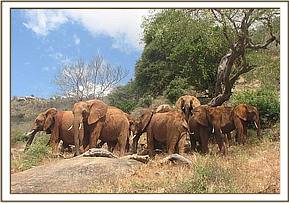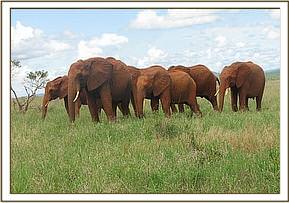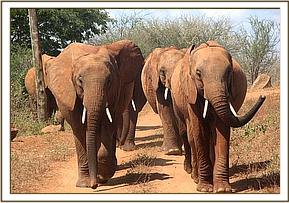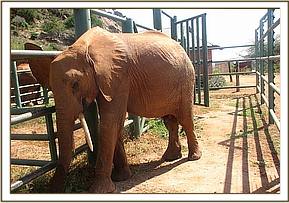Following the death of Mweiga on the 22nd December, 2007, whose heart failed her as she was returning to the Stockades in the evening, Natumi’s group of orphans never returned to the Stockades for 3 full months
Following the death of Mweiga on the 22nd December, 2007, whose heart failed her as she was returning to the Stockades in the evening, Natumi’s group of orphans never returned to the Stockades for 3 full months. Mweiga’s unexpected death was witnessed by Burra, whom Natumi’s group had assigned the duty of returning to keep Mweiga company on that particular day, something they diligently did on a daily basis whilst she was alive, ensuring that she was never without elephant companionship. Burra was distraught when Mweiga suddenly stumbled and died a few minutes later. He immediately ran to Natumi’s group, who were below Mazinga Hill at the waterhole, and there is no doubt that the sad news was conveyed to them, for they in turn headed straight to Emily’s group, who were further afield. The two groups then spent time together as one large herd under Emily’s Matriarchal leadership, but after a couple of weeks, Natumi’s group left that of Emily, and disappeared entirely for three months. This was uncharacteristic for previously they all kept in close contact with Mweiga, meeting her and her escort somewhere out in the bush on an almost daily basis, or else at the noon mudbath and sometimes back at the Stockades in the evening. 


It was interesting to us that it was the young bulls who were usually assigned Mweiga-Sitting duty, taking it turn and turn about, although Mweya and one other sometimes also did a stint. It is also interesting to observe that when the lions happened to be around the Voi Stockades eyeing Mweiga as they viewed as a vulnerable target, several of the now wild older orphans turned up to surround and protect her, anticipating a problem. Yet, following her death, not one of them returned to the Stockades for 3 full months, although Emily’s group returned once in the dead of night just to check the Stockades, perhaps needing convincing that Mweiga really had gone forever.
Emily’s group incorporates Aitong, Sweet Sally, Loisaba,Tsavo, Sosian, and Ndara, Sosian recently having swapped over from that of Natumi, but the orphans all regard one another as an extended family, and the composition of the two groups fluctuates from time to time. For instance, Edie enjoys being leader of a splinter group occasionally, traveling independently of Natumi and her charges, usually accompanied by Lolokwe, Solango, Burra and Mukwaju. However, using mysterious elephant communication, which we are convinced incorporates telepathy, the orphans are all in touch with one another at all times, something that is proven by the comings and goings of the Ithumba unit, chronicled graphically in every Keepers Diary.
Natumi’s group comprises Ilingwezi, Laikipia, Mukwaju, Edie, Icholta, Lolokwe, Nyiro, Mweya, Thoma, Solango, Burra, Seraa, Mpala, Irima, and Morani and it was a great joy for their Keepers to see them all again on the 15th March after 3 long months as perfectly wild elephants, all present and correct, looking happy and well fed. Likewise the Keepers were greeted with unbridled joy by their erstwhile charges. Rumbled elephant greeting, and trumpets filled the air, accompanied by urinating which denotes excitement and joy, plus trunks wrapped lovingly around human necks. The orphans spent about an hour back at their old home base in the company of their erstwhile human family before leaving again to enjoy their now established status amongst the wild elephant community of Tsavo East National Park. 
How true are the words of Dr. Gay Bradshaw who has studied the elephant brain. When elephants and humans are put side-by-side neuro-ethologically, science is hard pressed to come up with much difference. Instead, science, by force of its own evidence, shows elephants to be sufficiently like ourselves to confer an ethical status other than a depersonalized commodity”. In this, the 21st Century, it is time that humanity generally accepted this fact, and acknowledged that all animals are sentient beings on earth for the wellbeing and health of the planet as a whole and therefore worthy of human reverence and thoughtful humane treatment.
